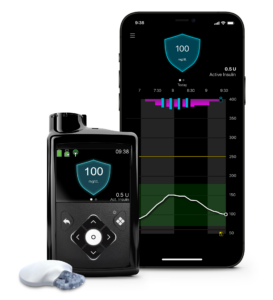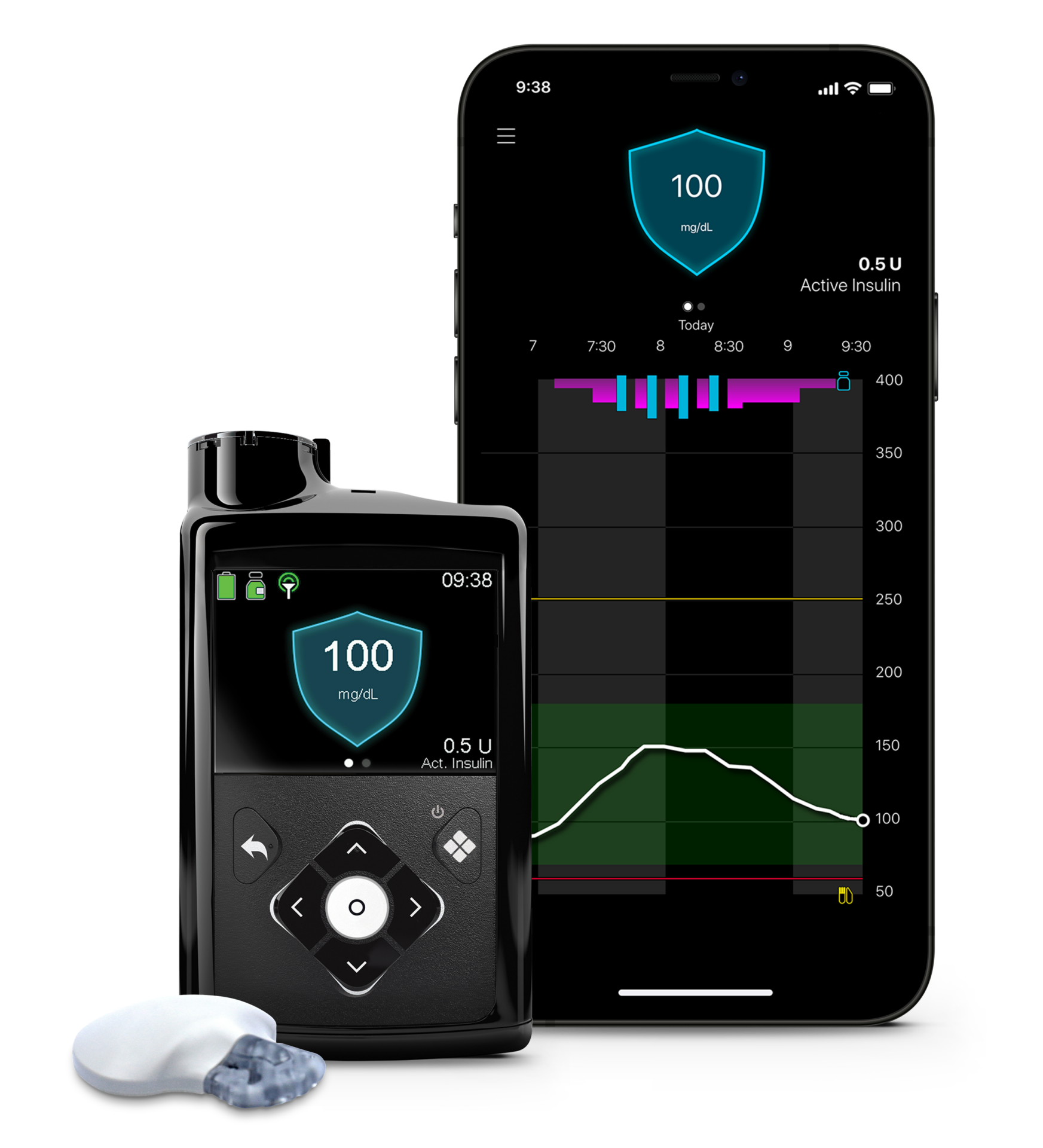Medtronic MiniMed™ 780G System
Features
- SmartGuard™ technology
- Automatic correction boluses
- Meal detection technology
- Extended wear infusion set
- Approved for individuals 7 years and older living with type 1
- CareLink™ Connect App
- MiniMed™ Mobile App
- Accu-Chek® Guide Link Meter
- Apple Watch
- Guardian™ 4 Sensor
Specifications
For further warranty information, instructions on appropriate use, and disclaimers, visit the manufacturer website: medtronicdiabetes.com
Description
For further warranty information, instructions on appropriate use, and disclaimers, visit the manufacturer website: medtronicdiabetes.com
Back to Catalogue
Frequently Asked Questions
Who is responsible for getting the insurance authorizations for medical supplies?
CCS Medical has a team of experienced authorization specialists who will oversee the process. Our knowledgeable staff will contact the ordering physician when applicable and the insurance company to verify coverage and obtain authorization for the product.
Does the company provide service and supplies to Medicare and Medicaid patients?
Yes. We are a participating provider with Medicare as well as most Medicaid and many Managed Care plans.
Are you a participating provider with other insurance companies?
Yes. Our company is contracted with hundreds of insurance providers nationwide. Our knowledgeable customer service team works on a daily basis with hundreds of private health insurers. We add insurance company contracts on an ongoing basis and will be happy to contact any carrier necessary to assist you in meeting your supply needs.
Are all products covered by my insurance company?
Coverage varies from one insurance company to the next. As part of our service, we determine if a particular product will be covered.
How much will a patient have to pay for his or her product?
It depends on the insurance plan and the patient's policy. All patients will be responsible for any co-pays or deductibles that their insurance company may have in place. Our specialists will help explain the patient’s financial responsibilities.
Do I need to apply for Medicare when I turn 65?
No. If you are already getting social security or railroad retirement benefit payments, you will automatically receive a Medicare card in the mail about three months before your 65th birthday as part of an enrollment information package. The card will usually show that you are entitled to both Part A (hospital insurance) and Part B (supplementary medical services). It also indicates the beginning dates of your entitlement to each. If you do not want Part B, follow the instructions that come in the package.
Who can receive benefits for diabetes self-management training?
Individuals covered by Medicare who are at risk for diabetes-related complications and meet other requirements can receive training if it is requested by their doctor or other qualified provider.
How do I know my diabetes supplies are covered by Medicare?
CCS Medical will verify your eligibility and benefits prior to sending your first shipment to ensure your supplies will be covered by Medicare. Deductibles and co-pays may apply.
How much is reimbursed for each product?
After you have paid your annual Medicare Part B deductible, Medicare will reimburse 80% of allowed amount or 80% of the billed amount, whichever is lower.
Does everyone pay the same amount for the Part B premium?
The premium is usually paid by the individual, either through deductions from social security checks or direct billing. The state you reside in may pay Medicare premiums if your income is low enough. Most people pay the same premium amount.
Are there limits on the quantity of diabetes supplies that Medicare will reimburse?
Medicare establishes certain limits based on whether or not you use insulin injections to treat your diabetes. Your physician will indicate how often you should test. Medicare may cover additional testing supplies if your physician determines it is medically necessary.
How do I replace my Medicare card?
Log into (or create) your Medicare account at Medicare.gov to print an official copy of your Medicare card. You can also call 1-800-MEDICARE (1-800-633-4227) to order a replacement card. TTY users can call 1-877-486-2048.
If I am 65 and ready to retire and my employer is going to provide me with benefits, do I need Medicare?
Yes. Medicare pays first in all situations unless you (or your spouse) are eligible under an employer-sponsored group health plan. If you have other questions, visit medicare.gov to learn more.
Does Medicare cover my spouse and family?
In general, Medicare is “individual” insurance. However, sometimes spouses and children can become eligible for Medicare based on the wage earner's work record. For questions about Medicare eligibility, contact the Social Security Administration at 1-800-772-1213.
What is the difference between Medicare and Medicaid?
Medicare is the federal health insurance program. It primarily covers people over age 65, regardless of their income. It also serves younger disabled people and dialysis patients. Patients pay part of the costs through deductibles for hospital and other costs. Small monthly premiums are required for non-hospital coverage. Medicare is a federal program. It is run by the Centers for Medicare and Medicaid Services (CMS), an agency of the federal government, and is basically the same everywhere in the United States.
Medicaid is an assistance program. It serves low-income people of various ages. Medical bills are paid from federal, state and local tax funds. Patients usually pay no part of the costs or very little for covered medical expenses, although a small co-payment is sometimes required. Medicaid is a federal-state program. It is run by state and local governments within federal guidelines, so it varies from state to state.
Medicaid es un programa de asistencia. Atiende a personas de bajos ingresos de distintas edades. Las facturas médicas se pagan con fondos procedentes de los impuestos federales, estatales y locales. Los pacientes suelen pagar poco o nada por los gastos médicos cubiertos, aunque a veces se exige un pequeño copago. Medicaid es un programa federal-estatal. Lo gestionan los gobiernos estatales y locales dentro de las directrices federales, por lo que varía de un estado a otro.
Medicaid is an assistance program. It serves low-income people of various ages. Medical bills are paid from federal, state and local tax funds. Patients usually pay no part of the costs or very little for covered medical expenses, although a small co-payment is sometimes required. Medicaid is a federal-state program. It is run by state and local governments within federal guidelines, so it varies from state to state.
Medicaid es un programa de asistencia. Atiende a personas de bajos ingresos de distintas edades. Las facturas médicas se pagan con fondos procedentes de los impuestos federales, estatales y locales. Los pacientes suelen pagar poco o nada por los gastos médicos cubiertos, aunque a veces se exige un pequeño copago. Medicaid es un programa federal-estatal. Lo gestionan los gobiernos estatales y locales dentro de las directrices federales, por lo que varía de un estado a otro.
Where should I send my Medicare premium payment?
Please visit https://www.medicare.gov/your-medicare-costs/how-to-pay-part-a-part-b-premiums to see your options for paying your Medicare premium bill.
Who can I contact for more information about Medicare eligibility?
Please visit https://www.medicare.gov/talk-to-someone or call 1-800-MEDICARE (1-800-633-4227). TTY users can call 1-877-486-2048.

